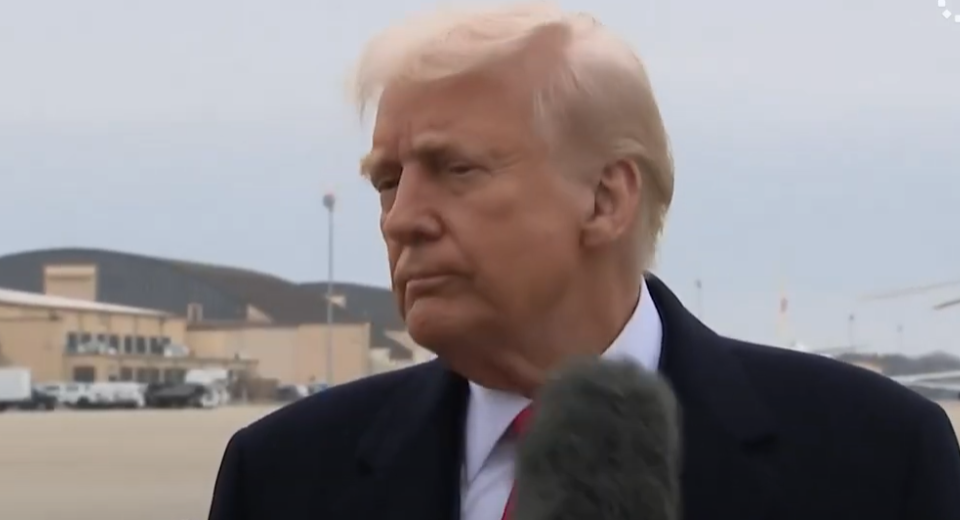Washington, D.C. – A controversy erupted today as conservative commentator Laura Loomer identified NPR White House reporter Danielle Kurtzleben as the journalist allegedly involved in an incident where President Donald Trump was struck in the face with a boom microphone. The incident, which reportedly occurred on a tarmac during a press interaction on Friday night, has ignited a firestorm of speculation about Kurtzleben’s political leanings and her role as a newly appointed White House correspondent.
Who is Danielle Kurtzleben?

Danielle Kurtzleben is a seasoned journalist who joined NPR’s White House reporting team in early 2025. Prior to this role, she covered political and economic beats for the outlet, contributing to stories on elections, policy debates, and cultural shifts. A native of Detroit, Michigan, Kurtzleben has built a reputation for detailed reporting, often focusing on the intersection of policy and identity. Her recent assignments have included coverage of the Trump administration’s executive orders and their impact on federal workers, including those identifying as transgender, nonbinary, and intersex.
Kurtzleben’s career at NPR spans several years, during which she has been part of the network’s expanded political coverage. Her work has appeared in NPR broadcasts and online platforms, where she has interviewed key figures and analyzed major legislative moves. Before NPR, she worked as a reporter and editor, honing her skills in data-driven journalism and narrative storytelling.
The Incident and Fallout
The incident in question unfolded when Trump was addressing reporters on a tarmac, a common setting for impromptu press engagements. According to Loomer, Kurtzleben wielded a boom microphone that made contact with the president’s face. While it remains unclear whether the act was intentional or accidental, Loomer’s posts on X quickly framed it as a deliberate move by an “anti-Trump” journalist. Within hours, Kurtzleben locked her X account, restricting public access to her posts and fueling further speculation.
Loomer, a vocal Trump supporter, broke the story on March 16, claiming Kurtzleben’s history of critical reporting on Trump and her advocacy for progressive causes—like LGBTQ rights—pointed to a clear ideological bias. “Just 18 minutes after I exposed the identity of the @NPR White House reporter Danielle Kurtzleben @titonka for hitting President Trump in the face w/ a boom mic on the tarmac, she just LOCKED HER X & protected her tweets so you can’t see how radical & anti-Trump she is,” Loomer wrote in a post that garnered significant attention.
NPR has not yet issued an official statement on the incident, though sources indicate the outlet is reviewing the matter internally. The Gateway Pundit, citing Loomer’s reporting, questioned why NPR withheld Kurtzleben’s identity for nearly two days and whether she had been interviewed by the Secret Service.
Left or Right Leaning?
Kurtzleben’s political leanings have become a central point of contention. Critics like Loomer point to her past coverage as evidence of a left-leaning bias. For instance, during the 2024 presidential campaign, Kurtzleben reportedly suggested Trump’s choice to speak in Howell, Michigan, might have been linked to the town’s historical ties to the Ku Klux Klan—a comment Loomer cited as proof of her “massive Trump hatred.” Additionally, Kurtzleben’s focus on the effects of Trump’s policies on marginalized groups has led some to label her a progressive sympathizer.
However, assessing a journalist’s personal ideology based solely on their reporting is fraught with challenges. NPR, as a publicly funded outlet, has long faced accusations of liberal bias from conservative circles, yet it strives to maintain a reputation for balanced journalism. Kurtzleben’s work often reflects NPR’s editorial tone—critical of policy impacts rather than overtly partisan. Without access to her now-private X posts, it’s difficult to definitively categorize her views. Her decision to lock her account may suggest an attempt to shield herself from scrutiny rather than an admission of bias.
Broader Implications
The incident has reignited debates about media conduct and access in politically charged environments. Loomer and others have called for Kurtzleben’s removal from the White House press pool, questioning how she was approved for the role given her alleged history.
“She should be nowhere near the president,” wrote Miranda Devine on X, echoing a sentiment among Trump supporters that the press corps harbors hostility toward the administration.
As of 9:11 PM EDT on March 16, 2025, the story continues to unfold. Whether Kurtzleben’s actions were a misstep or a manifestation of deeper animus remains a matter of speculation. What’s clear is that this episode has amplified tensions between the Trump administration and the press, with Kurtzleben now at the center of a polarizing narrative.
For now, the public awaits NPR’s response and any official investigation into the tarmac encounter. In an era where media trust is increasingly contested, Danielle Kurtzleben’s name has become a flashpoint in the ongoing clash over journalism, bias, and accountability.

